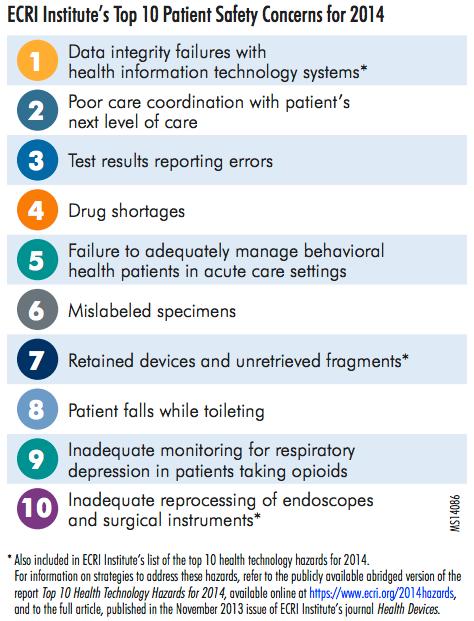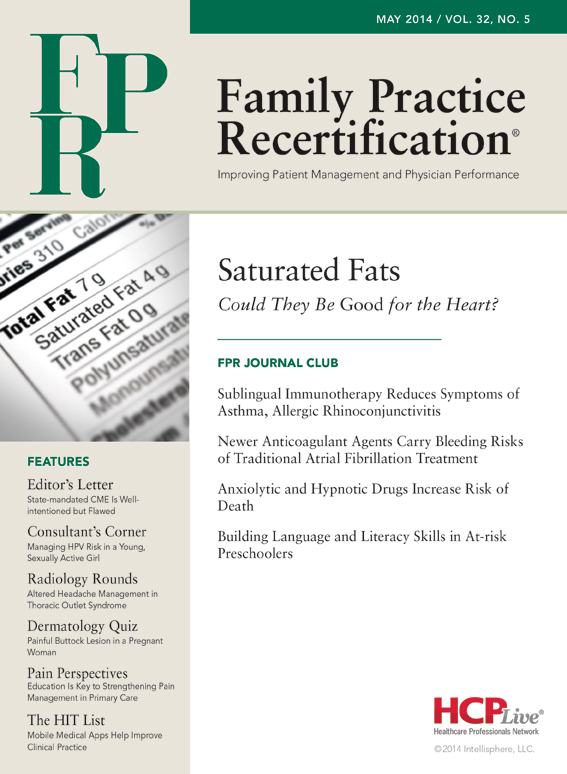Publication
Article
Family Practice Recertification
HIT Tops List of Patient Safety Concerns for Healthcare Practices
Author(s):
Medical hazards related to the use of health information technology (HIT) currently pose the biggest threat to patient safety, according to the inaugural industry report from the nonprofit ECRI Institute.

Medical hazards related to the use of health information technology (HIT) currently pose the biggest threat to patient safety, according to the inaugural industry report from the nonprofit ECRI Institute.
Partially based upon more than 300,000 safety events, research requests, and root-cause analyses submitted to the ECRI’s patient safety organization (PSO), the first annual “Top 10 Patient Safety Concerns for Healthcare Organizations” report identified and ranked the most pressing threats to patient welfare in 2014. Although the authors included test result reporting errors, drug shortages, specimen mislabeling, and poor care coordination during transitions to the next level of care in their report, electronic patient data integrity failures associated with HIT topped their list of safety concerns.

In the report, James P. Keller, Jr., MS, Vice President of Health Technology Evaluation and Safety at the ECRI Institute, partly attributed HIT’s top spot on the list to the fact that “use of these systems more than tripled from 2009 through 2012” in conjunction with the federal government incentives offered to physician practices and hospitals for implementing electronic health records (EHRs).
“Health IT systems are very complex. They are managing a lot of information, and it’s easy to get something wrong,” Keller wrote. “While appropriately designed and implemented systems can provide complete, current, and accurate patient care information so that the clinician can make appropriate treatment decisions, the presence of incorrect data can lead to incorrect treatment, potentially leading to patient harm.”
For instance, Keller and his co-authors pointed out that patient information recorded in HIT systems can be seriously compromised by data entry errors, failed or delayed data delivery, and copying and pasting old information into a new report, among other blunders. To mitigate those risks and preserve the integrity of electronic patient data, the ECRI recommended that medical practices and healthcare organizations with HIT take the following steps:
- Assess the clinical workflow to understand how the data is, or will be, used by frontline staff
- Test the HIT system and its associated interfaces, preferably in a simulated setting, to verify that it is functioning as intended
- Provide sufficient user training and support
- Establish a mechanism for users to report problems as they are discovered
However, Dean Sittig, PhD, Professor in the School of Biomedical Informatics at the University of Texas Health Sciences Center in Houston, told Medscape that healthcare professionals — from primary care providers, to pharmacists, to nurse practitioners — are often oblivious to errors in their HIT systems, so the ECRI’s latter recommendation to immediately report data integrity problems might be difficult for practices to follow.
Nevertheless, Karen P. Zimmer, MD, MPH, FAAP, Medical Director of the ECRI Institute PSO, noted the list “is not meant to dictate areas to address, but rather enhance and inform (healthcare organizations’) internal discussions about patient safety.”






